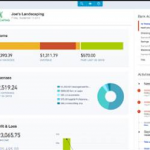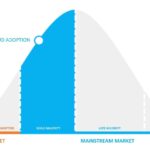QuickBooks vs Other Cloud Based Accounting Apps
With virtual software becoming more popular every day, there are many types of services available for all aspects of your business. When it comes to accounting for a small business, how do you know which accounting software is right for you? QuickBooks is known as the leader in the Accounting Software industry. QuickBooks is managed by the company Intuit.
In this article, we will breakdown 3 Accounting Programs and how they compare to QuickBooks to help you decide which one is the perfect match for your business.
QuickBooks Summarized
QuickBooks accounting software is readily available and easy to use for independent contractors, small business owners, and those who run larger corporations. Guiding you through the basics and beyond, QuickBooks Online accounting software can help you track your expenses and income. Get essential insights into your business’s future and keep your accounts organized for easy understanding and tax filing. QuickBooks offers software designed for small businesses called Simple Start, Plus, and Advanced. QuickBooks Self-Employed is a great tool for independent contractors who file a Schedule C, but you may find that you are ready to upgrade to another Quickbooks Online software with time.

Other Accounting Software
Even though many small and large businesses utilize QuickBooks, it is not the only cloud-based accounting software available on the market. Below are 3 other accounting software that are considered comparable to QuickBooks.
Xero
Xero is an accounting service popular in Australia and the United Kingdom. It has been growing in popularity in the United States over the past few years. They offer 3 monthly plans based on your business size and needs. This is a service best suited for micro-businesses with minimal transactions.
Some of the features this software provides is:
- Send invoices and quotes
- Enter bills
- Utilize Hubdoc for bills and receipts
- Claim Expenses
- Track projects
- Use multiple currencies
- Connect to your bank
A con of this software is that there is no reconciliation function in the software. Therefore reconciling accounts for a month-end is not an option.
FreshBooks
FreshBooks offers tools to help you understand your business and support the exact type of business you are running. FreshBooks is user friendly and has easy navigation for clients. It also costs less than most other Accounting software services but, it lacks features that its competitor, QuickBooks, provides. The mobile app is very limited
Wave
Wave is a service that is best suited for freelancers and independent contractors because it does not offer payroll services, inventory tracking, and has higher fees compared to the other accounting software companies. However, a bonus is that you can set up a free account that lets you have unlimited income and expense tracking, add unlimited users, organize your income and expenses, and get insight on how your business is doing in real-time. This is great for independent contractors who have a few clients and run a small niche business. However, they have a pay-per-use plan for payments, which can add up if you have many customers. Further, if you’re planning on growing your business in the future, it’s probably not ideal to use Wave.
How Do You Choose?
When deciding which online accounting software is right for you, try asking an accountant. An accountant can give you valuable insight into what software your business needs. If you don’t have an accountant, don’t let that hold you back. You can hire a virtual accountant at any time.
What does a virtual accountant do for a small business, you ask? A virtual accountant can guide you through the best and most efficient accounting practices available for your business. If you are thinking about hiring a virtual accountant, read our article on the 4 questions to ask an accountant when interviewing them. Your accountant can guide you on which software you need, what services you need, and then provide you real-time feedback as they work with you virtually.








